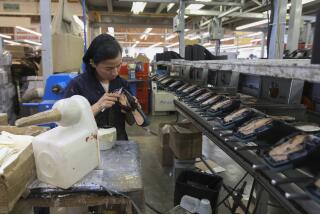American Trade Gap Soars $2.7 Billion; Imports Zoom : Report Sets Off the Sale of Dollars
- Share via
WASHINGTON — The U.S. trade deficit soared by almost 30% in August, the government said today in a report that sparked nervous dollar selling and drew soothing reassurances from the Reagan Administration and alarm from the Democrats.
The gap widened to $12.18 billion from $9.47 billion in July as imports grew about three times faster than exports.
The trade figure, which was slightly larger than had been expected, drove the dollar down nearly two West German pfennigs and two Japanese yen as dealers speculated that a further decline in the currency would be needed to make U.S. goods cheaper abroad and imported products too expensive to buy at home.
Dollar May Come Down
“If improvement in the trade deficit is stalling out, it suggests the dollar must come down,” said Jason Benderley, chief economist at Goldman Sachs and Co. in New York.
But Reagan Administration officials, eager to keep the markets calm in order not to spoil Vice President George Bush’s chances in the Nov. 8 election, said the overall trade balance continued to improve.
Trade Representative Clayton Yeutter said the deterioration in August was understandable because the July trade deficit of $9.5 billion “was uncharacteristically low, even given the solid improvement that is expected to take place this year on our trade account.”
Average declines
The average deficit in July and August was $10.8 billion, $1 billion less than the average of the first half of the year and well below the $15.6 billion peak of last October.
At the rate of the first eight months, the 1988 gap would be $138.5 billion, down from a record $170.3 billion in 1987.
“It shows one-month volatility of the numbers, but they’re going in the right direction,” White House spokesman Marlin Fitzwater said of the August report. “The trade deficit is going down and we expect this trend to continue.”
But with the United States showing no signs of balancing its books in the near future, bond yields rose slightly in anticipation of foreign investors demanding higher rates of return on the $140 billion or so they lend each year to plug the trade gap.
Used by Democrats
The figures also provided fresh ammunition for Democratic presidential candidate Michael S. Dukakis, who charges that foreigners are buying factories and real estate with the dollars they earn from the goods they sell to America.
“This kind of a deficit cannot be allowed to continue to mount. Every time we sell off some of those securities (to foreigners), we endanger our economic independence,” Dukakis’ running mate, Texas Sen. Lloyd Bentsen, told reporters.
The stock market, having anticipated worse, largely shrugged off the August report.
It was a disappointing set of trade figures for August, 1987, that helped trigger the Oct. 19 stock market crash, when equity prices fell 22.6%.
Exports, adjusted to smooth out seasonal fluctuations, rose 3.9% in August to a record $27.55 billion. But imports jumped 10.4% to a record $39.72 billion.
Consumer Imports Up
Imports of consumer goods, including cars and food, rose $1.1 billion in August. Imports of capital goods rose by the same amount.
The surplus in farm trade fell to $813.5 million from $884 million, while the nation’s oil bill rose 8.2% to $3.70 billion from $3.42 billion.
The deficit with Japan, which is larger than with any other country, widened to $4.75 billion in August from $4.44 billion in July, and the gap with the newly industrialized countries of Asia rose to $3.23 billion from $2.68 billion.
More to Read
Inside the business of entertainment
The Wide Shot brings you news, analysis and insights on everything from streaming wars to production — and what it all means for the future.
You may occasionally receive promotional content from the Los Angeles Times.










